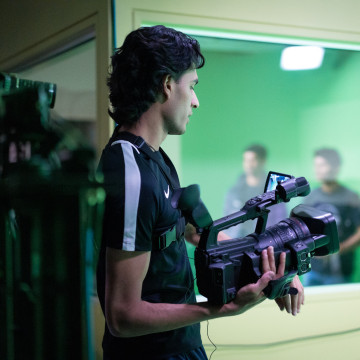

Year 12 Media Units 3 and 4
Overview
Unit 3 of Media Studies delves into the captivating world of stories that circulate our society by closely examining media narratives. We learn about the tools and patterns, called codes and narrative conventions, that creators use to shape these stories and give them meaning. By studying a media narrative in depth, we become familiar with the language used in media and gain a deeper insight into how narratives are produced. We also explore how factors like the times we live in, historical events, culture, and even politics can shape the stories we see and how we interpret them. Through this, we begin to understand how to create our own media works using these techniques, focusing on a media form that interests us. We get to plan and design our own media products and experiments for a specific audience, learning about the technical aspects of media production.
Unit 4 of Media Studies is all about bringing our media creations to life and understanding the impact of media on society. As we work on our creations, we learn to improve them by using feedback and personal reflection, and we keep track of how they evolve during the process. We look into how the media interacts with audiences and the changes happening in the media industry today. We explore the ways media can be used by governments, institutions, and people like us, and we take a close look at how Australian governments make rules for the media we consume. This unit helps us understand not only how media is made but also how it affects the world around us.
Who is it for?
This subject is for students who enjoy exploring the stories that shape our world and are curious about how media narratives work. It’s also a great fit for those who want to understand the behind-the-scenes processes of film, TV shows, and other media forms. If you’re someone who wants to uncover the secrets of storytelling, learn how media reflects and influences society, and even create your own media projects, then this subject is a perfect match for you.
Whether you’re a budding filmmaker, a critical thinker, or simply someone who loves the power of storytelling, Media Studies offers an engaging journey into the captivating world of media narratives and their impact on our lives.
What do you do?
Students will produce a short film, podcast, photography series, magazine, or hybridised media product. They will make a video essay about a media narrative which highlights a film’s use of media codes and conventions. Students investigate the context of media products and use this knowledge to develop their own media production plans.
What skills do you need?
For success in this subject, students need a combination of analytical, creative, and critical thinking skills. They should be curious and willing to explore various media narratives and products. Strong reading comprehension and communication skills are essential for understanding complex media theories and articulating insights effectively.
An ability to think critically and evaluate media content is crucial for analysing the codes, conventions, and meanings embedded in narratives. Practical skills, such as media production and technology familiarity, aid in creating your own projects. Lastly, an open mind to engage with diverse viewpoints and a passion for storytelling are invaluable traits for excelling in Media Studies.
What skills do you develop?
You will develop skills including:
- analysis of the construction of media products and the audiences that consume them
- critical thinking about the relationships between media products and the society that produced them
- planning and writing well-structured and concise responses
- media planning and production techniques.
Requirements
Students require media equipment and technologies appropriate to their chosen media form. Depending on the student’s media form, this may include equipment such as a camera, tripod, and microphone.
Students should use devices that meet the system requirements for Adobe Premiere Pro (see here).
Students require a fast internet connection and/or an external hard drive so that they are able to backup their work regularly.
Things to think about
Before selecting Media, consider the following:
- you should be comfortable engaging in both the theoretical and creative components of this subject
- you may need to film, photograph, or edit in your school holidays
- You should be prepared for challenging written tasks including timed short answer responses, pre-productions documentations, and report writing.
Things you can do now
In preparation for Media, you are encouraged to watch the VSV Media Showcase (https://vimeo.com/showcase/10017464). Once you have watched these videos, you should begin brainstorming your own media product idea. Please note that you cannot start producing your media product before your teacher gives you permission.
You are encouraged to watch Parasite prior to the start of the school year. If you’re currently enrolled through VSV or another school that uses ClickView, you can watch Parasite here. Once you’ve watched Parasite, you can view Thomas Flight’s excellent analysis videos on Clickview.
Things to have a look at
The Visual Architecture of Parasite
‘Parasite’ Director Bong Joon-ho Breaks Down the Opening Scene
Sriracha—Full Movie with Director’s Commentary
Develop your media production skills by watching this excellent video about the making of the Sriracha documentary by Griffin Hammond.